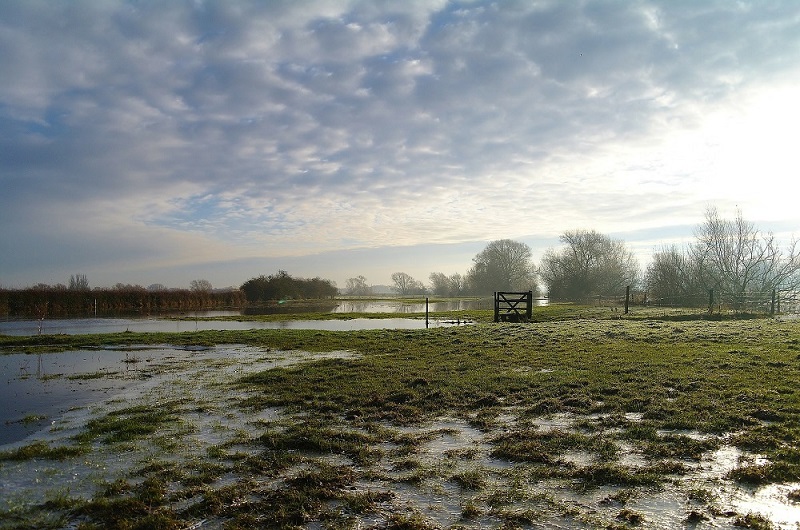The sudden extreme weather that is causing disruption across the UK, prompts us to remind you of our article about adverse weather. Be it floods or snow, are you prepared? Tony Poole, the Managing Director of Synergy Technology warns not to be complacent, protecting valuable business data and reducing the risk of financial loss due to damage to IT equipment and the subsequent disruption to business is critical to SMEs, particularly in areas susceptible to flooding or affected by snow. It may happen again!
“The Environment Agency warns that climate change will increase the risk of more floods across the UK, leading to further problems for businesses and homeowners. Whether or not we can expect more frequent adverse weather conditions, business owners must remember it only takes a single disaster to potentially wipe out the whole business with the damage it can cause.” warns Tony.
“Even if a flood is not necessarily on your doorstep and whether or not water damage is destroying your premises, it may affect the power supply to your business or accessibility to your office for your workforce. It is also important to remember that supplier catastrophes are as critical as your own, so know your supply chain too. It is therefore essential to consider how prepared you are to avoid an interruption to the daily running of your business, and the long term financial effects that adverse weather may cause to your business.
Many of these problems can be avoided by ensuring you are well prepared and that your systems are set up to cater for unexpected interruptions to the running of your business due to natural disasters.”
Based on his own client experience, here are Tony’s 10 useful tips to avoid disruption to your business due to flooding or adverse weather condition.
Ten Top Tips to keep your business afloat in the next floods.
TIP ONE :
Back up and storage of critical data
It is important to instil a regular data backup procedure. Power cuts, flooding and energy shortages will cause disruption, but preparation is key. As long as staff know in advance what to do if the worst happens, data can be saved. For organisations, a solid data backup plan is the best way to keep critical data protected; establishing a relationship with a trusted data recovery provider should also be an integral part of any disaster recovery plan.
Conduct a data assessment. Know your high-value data assets – where your customer information and other sensitive data is stored, which files are heavily used, who is using them and which departments and teams they align with. Try to restore data on a quarterly basis.
Prioritise what data you need to have on hand after a disaster and who will need to have access to it. And don’t neglect laptops, as most people do. Most disaster recovery plans are focused on protecting just the office server and business data stored at data centres.
Remember – never assume that data is irrecoverable. Professional data recovery services offer the expertise and tools required to recover data quickly and successfully.
TIP TWO :
Make sure critical applications are also accessible
Not only does your business data need to be backed up and accessed during a flood crisis, but business applications too. Make sure critical applications are also accessible. Protecting your data is not enough if you want to keep the business running during an event that causes downtime. Ensure critical applications can be virtualised in the cloud and are licenced for use in different locations or from different hardware and devices, should you have to change the location and computer equipment used, if your business office and IT equipment is affected by floods.
TIP THREE :
Keep sensitive electronic equipment high and dry!
It might seem obvious, but if your office is susceptible to the risk of flooding, keep IT equipment and cables at a reasonable height off the ground and store critical equipment on higher levels, i.e. first floor or second floor. Make sure that your team switch off and disconnect computers and electronic equipment at the end of the working day, leaving only the vital systems operating.
TIP FOUR :
Secure your data by using offsite servers
SMEs can actually improve their disaster preparedness by adopting a hosted workspace and cloud data storage which also greatly improves backup costs, recovery of data and boosts performance, and also reduces the requirement for office-based critical IT support.
Store business data in a secure cloud or hosted workspace and keep backups off site, in a safe location. How far off site depends on the risks you are worried about. Essentially, you are putting your business operational network into a hosted cloud environment and it is then delivered to you on-demand. The onus of responsibility for security, updates, redundancy, and failover and business continuity then rests with your hosted provider.
Cloud storage and hosted workspace providers such as Citadel digital workspace and cloud services, takes away the requirements for an in-house server and subsequent in-house maintenance and server-based IT support. Desktop hardware can be replaced with the most up-to-date hardware or mobile devices available on the market offering significant additional cost benefits and user flexibility.
TIP FIVE :
Reduce the risk of damage to IT and computer equipment
By implementing a hosted workspace you immediately reduce the computer hardware and IT equipment required onsite in your office and you can operate your business using much less desktop hardware. Therefore much less computer equipment is at risk of water damage due to flooding.
Most business applications for users delivered via virtual desktops have very minimal requirements, so any laptop or mobile device with internet access is likely to be able to access the virtual workspace.
TIP SIX :
Adopting a virtual environment where your team can work from any location
Creating a flexible workspace is king. By adopting a mobile workspace for employees, users of a hosted workspace can gain a full desktop experience from Internet-enabled devices as varied as tablets, smartphones or their home computers.
Your business programs, applications and data delivered from the virtual desktop can therefore be accessed from any location – not just the office, so employees can even work from home.
If flood risk is imminent, encourage workers to take their laptops, work phones and other vital equipment home each night.
If creating a mobile office solution works for your business, just make sure in advance that your employees have a suitable Wi-Fi connection at home and that your insurance policies cover both the employees and company equipment when working from home.
TIP SEVEN :
Prepare a back-up workspace for business
In the case of flooding or a similar disaster affecting your office, if your employees still need to work collaboratively from one location, then ensure you have access to an alternative office location. Temporary office space leases are available with options to access:
- Executive meeting room access
- Wi-Fi, IT and phone support
- Reception services
So make sure you have already a record of suitable temporary office services (think carefully about their location) which have the capacity to meet your business needs and can offer you office space at short notice.
TIP EIGHT :
Keep things running
When storms and other natural disasters strike, small businesses are especially vulnerable to power outages. While larger companies may have multiple locations that can pick up the slack while operations at one site shut down, the same is usually not true for the typical small business, particularly businesses in rural locations where the priority for reconnection may be lower than for nearby town centres.
Small businesses can combat these potential issues by installing a generator. Two basic varieties of generators are available. Automatic, or standby, generators that are permanently connected to a building’s electrical system. When the power shuts down, those generators automatically detect the problem and restore power to the building. On the other hand, portable, or backup, generators run on gasoline or diesel and have to be manually installed once a power outage occurs. While automatic generators require little or no work for the business owner, portable generators are typically less expensive.
TIP NINE :
Prepare a Crisis management procedure
To prepare for any future threat to your office being affected by flooding, prepare an effective disaster recovery plan. During a chaotic emergency in which there is flooding, fires or power outages, your team may not have the time to follow a long, complicated plan.
A plan must identify crisis management team members and set out their roles and responsibilities. It should also establish processes that:
- Engage the right people at the right time
- Maintain effective communication
- Manage information and resources to keep the business running
- Promote timely decision making
Think through the most likely threats to your business, cover all aspects, as well as natural disasters such as flooding keep in mind everything from human error to component failure. Most disasters happen without warning. This is what makes them so difficult to deal with. The actual disaster is not going to happen regularly, it’s going to be more chaotic. You need to be prepared.
TIP TEN :
Have a practice run!
Once you have considered all of the tips, make sure that your plans and preparation for running your business in adverse weather actually work, and don’t wait for the next spate of floods to see if your business sinks or swims! Try it and try it again. If you plan, the likelihood is that your business will stay afloat!
Would you enjoy working in a rural environment?
Synergy Technology is based in Wyre House, Nateby Business Park which is located in the stunning rural setting of Nateby. Working from a converted barn complex the Synergy Technology team enjoy the balance of working in a stress-free environment with a calm countryside location yet still operating a fully professional IT business. “Our office environments were designed from the outset to be disaster ready. We have an onsite generators, fibre and lease lines, CCTV with 24 hour onsite security, yet all set in a tranquil environment with nothing but beautiful views to fill your vision and inspire your team.” says Tony.
“We should encourage more businesses to set up office in rural areas to engender a more calm and welcoming working environment for employees” he adds. “Reducing the stress of commuting to crowded and expensive office locations in the city and town centres can only be beneficial to both the business and employees.”
“Our rural office can operate independently in adverse flooding or similar situations. Says Tony, “By adopting a hosted IT system and engendering a mobile workspace it is the ideal solution to meet these requirements. I welcome any local business to come and take a look at our rural premises and determine the benefits of a peaceful rural office location. We have office space available for your business, and we can also discuss your business IT and data security, in fact, we can offer you a complete business solution.”
Footnote: For businesses located in areas prone to flooding, The Environment Agency provides a comprehensive guide for SMEs “Would your business stay afloat? A guide to preparing your business for flooding”


